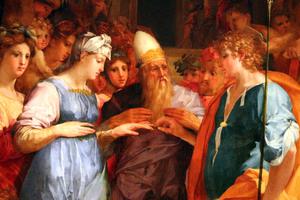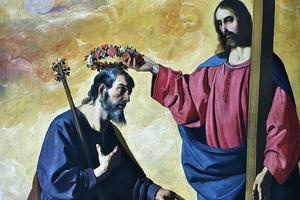St. Joseph — A Man Silent, Strong and True
The work to which Joseph has been summoned can be summed up in a single word: Protect.

How strange that the Scriptures should remain so very nearly silent on the subject of St. Joseph. Imagine if God had inserted someone else into that odd mixture of mysteries. Like me, for instance. I don’t know that I’d have kept quiet. Sandwiched between the Incarnation and the Immaculate Conception? I suspect I’d have told everyone. There’d be no end of interviews and book deals and film rights in cornering that market. Which certainly explains, among a hundred other reasons, why I was never asked to be St. Joseph.
But surely someone as close and indispensable as Joseph was to the Mother of God, not to mention a helpless Child whom God had entrusted to his care, ought to have whole chapters devoted to his life. Instead, so little is said either about him, or by him, that one might almost be forgiven for forgetting him altogether. Why didn’t he at least keep a diary? Or have a friend with whom he might unburden his soul concerning the great events of his life? How helpful it would have been had a journalist-friend actually been there to write it all up, trumpeting the tale far and wide.
But nothing of the sort ever happened. In fact, if it weren’t for one or two details about being married to Mary, then being appointed guardian of Jesus, there would be nothing to report. But, then, what else is finally worth reporting? From such scraps whole volumes could be written of the character of this man. On hearing, for example, that Mary is with child, what kindness he showed in choosing to divorce her quietly, refusing to draw attention to her predicament. He certainly would have foreseen the awful fallout that was bound to follow, including the very real possibility of exile and death. Yet he resolves not to expose her to the reproaches of either law or neighbor.
And when the angel tells him in a dream not to be afraid to take her into his home, he moves unhesitatingly to welcome her as his bride, thus becoming for all time a model of manly courage and obedience. Never putting himself at the center, he seems to have been endlessly solicitous of the little family God had asked him to care and look out for, evincing no less than that “superhuman oblation of self,” of which Pope St. Paul VI once spoke. And though “the big picture” escapes him, to recall the words of Pope Francis in Patris Corde (“With a Father’s Heart”), issued last December on the Solemnity of the Immaculate Conception (Dec. 8, 2020), he accepts everything as pure gift from God. Including especially the Child whom, in recognition of his paternity, it is given to Joseph to name, thus ensuring his protection amid the juridical patchwork of Israelite law and custom.
“I like to think,” the Holy Father conjectures, “that it was from St. Joseph that Jesus drew inspiration for the parable of the Prodigal Son and the Merciful Father.” What a happy thought that is, to imagine a little boy who, in watching his father, wanting to follow in his footsteps, finds a norm of goodness that, years later, goes into the telling of a story so absolutely central to the Christian message of mercy. Perhaps, too, in his prayer life, amid so many profound silences, Jesus would likewise have taken notice, seeing the pious man on his knees before our common Father.
There are some lovely lines by Anthony Esolen, which seem so wonderfully expressive of the mystery that surrounds this man, a mystery in whose depths he must have dwelt from the moment he first awoke from the dream. That to him, this ordinary human being, this carpenter man, “was announced the re-creation of the world. He could not have understood it. But he knew it was not only a dream.” Who knows, perhaps it may explain his silence as well. Because, after such knowledge, what does one then do? One is necessarily reduced to silence. Not a supine or helpless silence, but one which, beneath the weight of so much mystery, moves one to marvel and take delight in the designs of a God with whom reason cannot reckon. “The impossible things that are,” is how Chesterton once put it.
All that Joseph has been summoned to do, the work he must perform to remain faithful to the promise given, can best be said in a single word, a word which carries the force of an imperative: Protect. He must protect his wife lest she be destroyed by scandal. He must protect his Son lest Herod devour him. And once delivered from his clutches, he must return both Child and Mother to their shared homeland, not relinquishing for a moment the work of being their protector. He will even teach the Child how to walk, Pope Francis tells us, taking him by the hand. “Raising the infant Jesus to his cheeks, bending down to feed him.”
When will it end? We don’t know, of course, only that it must at some point lest Joseph be forced into a circumstance where he cannot protect the Child any more. And so Joseph, taken from Mary and Jesus before the Evil One can mobilize his legions, seems to be a great mercy extended to one who could not then have prevented the Child condemned to carry a Cross for the world’s salvation.
- Keywords:
- St. Joseph

















